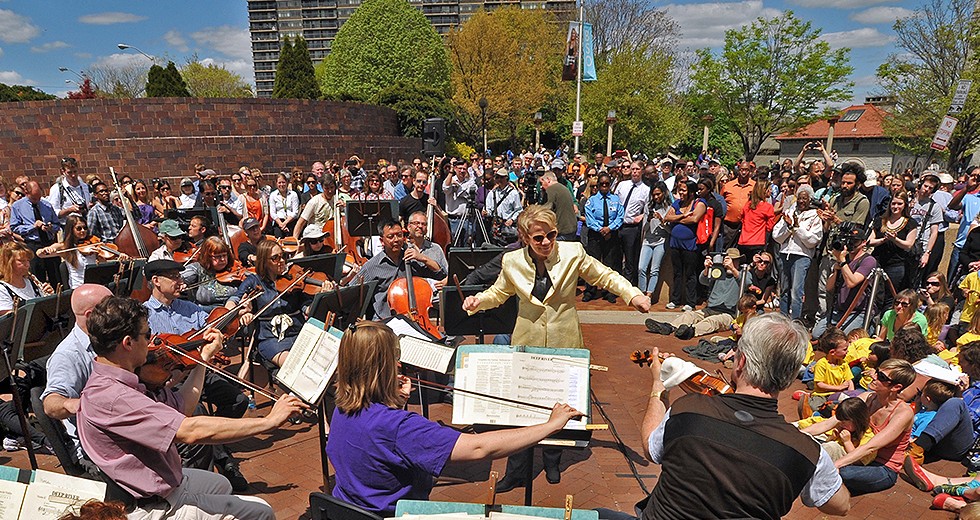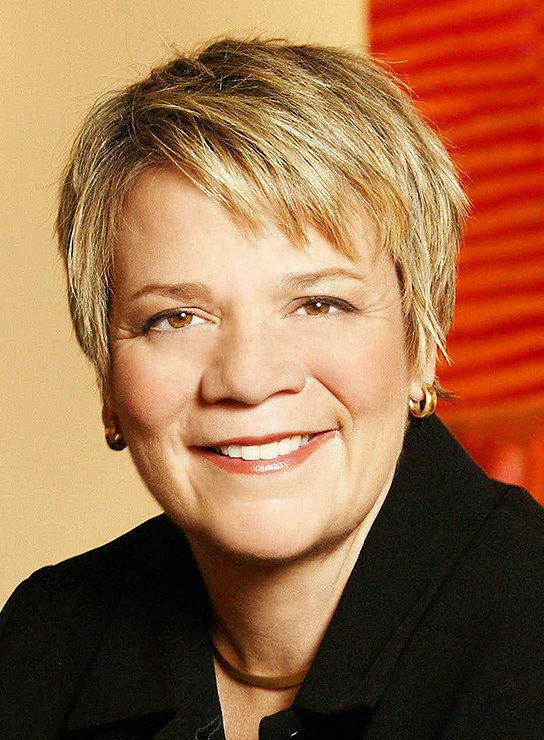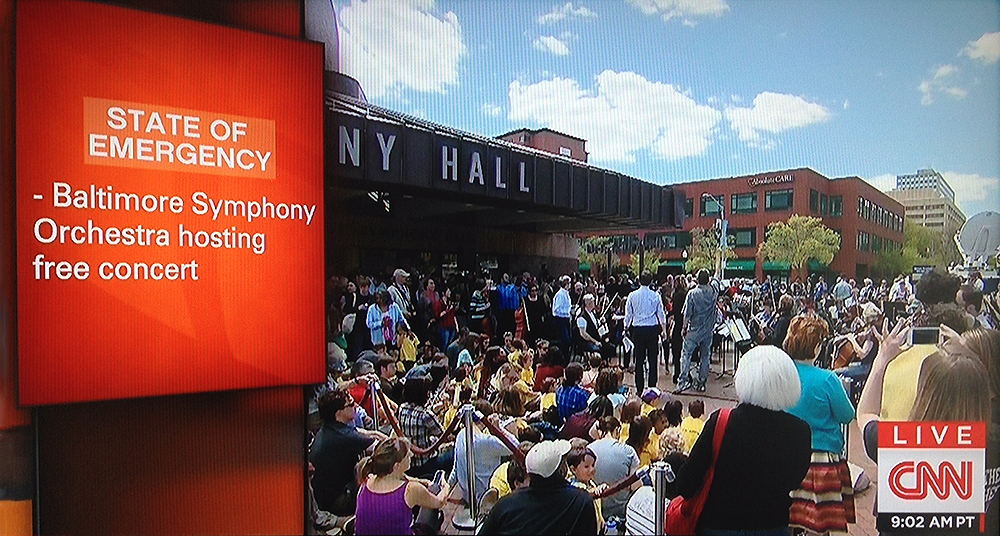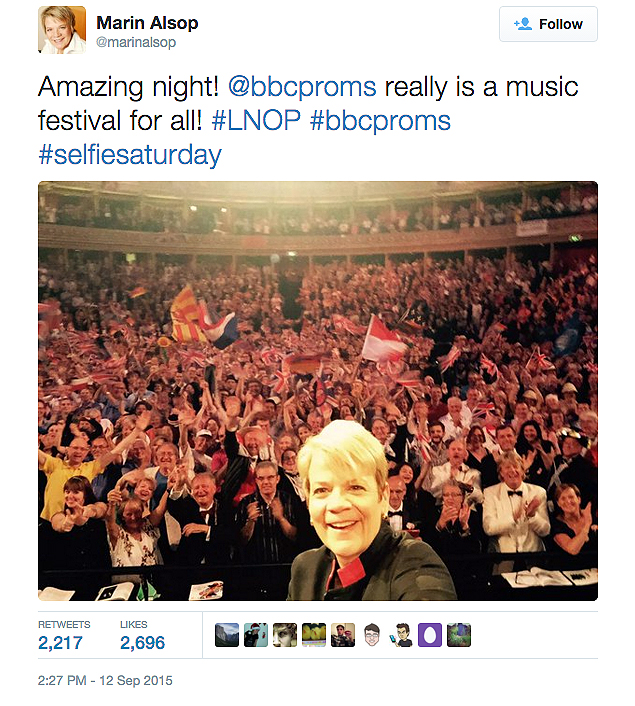
Please, won’t you be Marin Alsop’s neighbor?
The American conductor welcomes everyone, everywhere, because there’s plenty to work on together. Taking a cue from mentor Leonard Bernstein, New York’s legendary leader with an eye for national causes, Alsop looks from atop her international podiums toward local efforts where she — and you — can lend a hand.

Marin Alsop believes strongly in community engagement: “Classical music can’t exist in a vacuum.” | Photo: Kym Thomson
Recently she spoke by phone about communities that matter to her — Baltimore, her home since 2007, where she’s music director of the Baltimore Symphony Orchestra; São Paulo, Brazil, where her State Symphony Orchestra is on the rise, and London, where she’s a favorite at its festive Last Night of the Proms. Chicago joins Alsop’s roster Thanksgiving weekend, when the conductor makes her long-anticipated downtown debut with the Chicago Symphony Orchestra — you’re invited to the gathering Nov. 27-29.
In Alsop’s towns, good neighbors tackle challenges together. Mentions of April protests that shook Baltimore, São Paulo’s sinking economy and podium politics she just pitched to a partying London audience — a stern litany — get a determinedly positive spin when Alsop speaks. The bigger the task, the stronger she pushes. “I love it,” the maestra might say, and does, several times during the interview.
Alsop is forthright — “I don’t think anyone’s ever been able to put too many words in my mouth.” She speaks them often, and always in an inclusive spirit. “Classical music can’t exist in a vacuum. Nothing can,” she says. “We’re in this age where everything’s connected, and we have to be part of that.”
Looking beyond Baltimore’s turbulent April
The death of Baltimore resident Freddie Gray in police custody reopened a national debate about race and law enforcement, with an unsparing spotlight focused on the city’s protests and scattered violence. Maryland called up its National Guard on Monday, April 27, and Baltimore schools closed the next day. At mid-week, the Orioles played silent baseball in an empty ballpark, a nod to public safety; the same afternoon, Alsop and the BSO gathered outside Meyerhoff Symphony Hall for a spirited, impromptu community concert.
The concert, Alsop says, “was an idea that originated with the musicians. I said, ‘I’m in town. If you want me to participate, I’d love to — but mostly I want to support what you guys want to do.’
“A thousand people came out — kids from the kindergarten, players across the street. It was a hot, beautiful sunny day and everybody wanted to be out in their neighborhood and feel safe and feel connected. I think the music was able to do that. We have to use the great art we have to bring out the best in humanity — it sounds a little bit trite, but I think that day we all saw that we had achieved that.”
Alsop’s commitment to Baltimore goes well beyond the admirable symbolism of that April day. She’s at ease in the community, where she’s lived since 2007, and with its musicians — both professional and aspiring. The conductor sees the city outside her concert hall — its strengths and setbacks — and looks for long-term opportunities to better reflect Baltimore’s demographics, both in the audience and on stage.

CNN captures Alsop and the Baltimore Symphony Orchestra’s impromptu concert: “Everybody wanted to be out in their neighborhood and feel safe and feel connected,” the conductor recalls.
“[Baltimore] has the urban feel, but there’s also a small-town vibe to it and a lot of neighborhoods,” she says. “People know each other. It’s a very user-friendly city. That said, it’s also a city with a lot of big issues, because it was a manufacturing city — a real blue-collar city — and when the blue-collar jobs left, Baltimore had to struggle to refind its footing.
“The challenge for any arts institution, I think — particularly symphony orchestras — is to set out to connect with people about one’s relevance. When I started in Baltimore, the thing that struck me so much was the fact that Baltimore city is 75, 80 percent African American, and yet in an orchestra of 90 players, there’s only one African American. How can that be?
“It was clear to me that it was merely a roll of the dice — that not enough African-American kids were being given the opportunity to play instruments, so I said, ‘Let’s try musicians. Let’s try to change this paradigm and somehow create a new landscape.’
“We talked about it for about a year, and finally started a program with 30 kids in West Baltimore — this really tough neighborhood — and today we have 1,100 OrchKids, [as] we call them, playing musical instruments and performing, not only around Baltimore area, but around the U.S., and it’s fantastic.”
Alsop grasps the personal tales behind the youth training program’s strong numbers. “I’m particularly interested in the stories of the girls, being a girl myself.” She asked one of the students, “’How has OrchKids affected your life?’ — we were having a little talk — and she said, ‘Well, I used to leave school and get in fights. I was very, very angry all the time.’ And I said, ‘How is it different now?’ She said, ‘I realize when I see people fighting, I think, wow, what a waste of energy — you could be playing a musical instrument.’ I thought, ‘All right, this is good. This is a good thing.’
“It’s been great, of course, for the kids, but really it’s been great for us. The thing I love about Baltimore is that everyone tries to help each other — it’s that neighborhood feel. We have big issues, but we’re not afraid to get them out in the open. We’re not afraid to try to come work on them. We’re not afraid to try to make changes together.”
Musical growth and economic struggle in São Paulo
In the huge South American country where President Rousseff — universally known by her first name “Dilma” — steers a sinking economy that’s destroying her approval ratings, Marin’s strong orchestral leadership is arguably turning the maestra into Brazil’s most respected woman with a five-letter moniker. Alsop is lifting the international profile of São Paulo’s State Symphony Orchestra and reaching out to Paulistanos at home, drawing new audiences in a city 19 times the size of Baltimore.

Marin Alsop poses with the future musicians of NEOJIBA, a youth orchestra program in Salvador, Brazil.
Alsop’s São Paulo is “a megacity. It’s 20 million people. It’s huge. Enormous. It’s sprawling. It’s like urban on steroids. It’s a very, very different experience.
“For me, Brazil, and São Paulo in particular, is all about ideas and possibility — and I love both of those things. The orchestra goes from strength to strength.”
But Dilma’s austerity efforts are coloring Marin’s musical successes. “It’s a rough moment right now because the economy of Brazil is kind of tanking,” Alsop says. “It’s interesting because I’ve lived through this in many places in the U.S., so I feel that it’s a good moment for me to be there because I can bring some measure … I mean, within the realm of my understanding.
“Of course, Brazilian politics and hierarchy is beyond me, but at least I’ve survived [crises] a few times, and so I can be a voice of calm and try to help them gear things in the right direction. But I would say that this is a … it’s like diving into a big, I don’t know, sort of chaotic cauldron of possibility. That’s what it feels like to me — and I love it.”
Big cities face tough challenges, and Alsop is learning to focus her advocacy. Sometimes a seemingly simple issue can become a complex mess, limiting her possibilities. Sixteen years ago, São Paulo converted an old, rectangular train station into the remarkable “shoebox”-style concert hall where Alsop conducts. It’s adjacent to the unfortunately nicknamed “Cracolândia,” where concertgoers headed from the nearby metro share sidewalks with crack cocaine users. The problem is aggravated by local squabbles between haves and have-nots, nationally debated in terms of personal autonomy vs. human tragedy and written into vérité telenovelas filmed near Sala São Paulo.
The city’s troubled sidewalks are “not an issue that I’m going to be able to resolve. That I do understand. I think I can impact, at least, perhaps, how orchestras may look in Baltimore — how the orchestra may look in 20 years in terms of the demographic makeup. But these are systemic problems in Brazil that need to be resolved from, I think, a much more fundamental place.”
Straight talk at London’s Last Night

Smile, Britannia! Marin Alsop tweets a selfie from London’s “slightly wacky” Last Night of the Proms.
Orchestra demographics were very much on Alsop’s mind this September, when she roused the better half of London’s partying crowd at its Last Night of the Proms — the national concert spectacle that’s equal parts Edward Elgar and Austin Powers — with witty, if pointed, remarks on numbers that need changing.
Speaking to her second Last Night crowd, Alsop, who in 2013 was the first woman to conduct the famed celebration, told fellow revelers in Royal Albert Hall: “When I was last with you for this amazingly wonderful and slightly wacky celebration, I shared how proud I was to be the first woman to conduct the Last Night of the Proms. I have to share, though, that I am even more proud to be the first second woman — maybe it’s the second first woman; I’m not sure.
“What excites me is that now we’re going to see the third, the fifth, the tenth, the hundredth woman to follow me because we have to work toward a more just and equal playing field for women.”
Apparently Switzerland’s Lucerne Festival was listening. Six weeks later, the month-long festival announced 11 women will lead concerts next summer, Alsop included. Lucerne is nicknaming the effort “PrimaDonna.” “I think it’s pretty cool,” she says. “I’m really thrilled about it. I think it’s a wonderful first step.
“The trick is not to make it a one-time experience, so that women are represented always. I think of women conductors, but I think also of women composers who really should be part of the mainstream repertoire performed by orchestras, and often are relegated to when they do a festival of women’s music, or something like that, which is all lumped together.” She shares an ironic laugh. “Let’s get those women over with right now!”
First time in downtown Chicago
So Alsop is helping a London composer she introduced to São Paulo audiences write more music for Baltimore: Anna Clyne, recently the CSO’s co-composer in residence, who assumed that singular post with Alsop’s BSO this autumn. Clyne keeps her familiar Chicago spotlight, too; Alsop leads off her CSO concerts here with the festive Masquerade, which the composer wrote and the conductor led for London’s Proms two years ago.
In July, Alsop and Clyne were also São Paulo collaborators for The Seamstress, the composer’s new violin concerto, which soloist Jennifer Koh and the CSO had just premiered in Chicago. Violinist Koh was headed to São Paulo next, so in an interview last spring with Clyne, I asked her about what struck me as an uncommon confluence — a woman composer, conductor and soloist partnered for a new work with a major symphony orchestra.
Clyne’s reply was polite but curt. “A happy coincidence.”
So I put the same question to conductor Alsop and got a similarly short answer. “I didn’t even notice it.”
Alsop’s come to expect fumbled questions about her unique role atop the world’s podiums, and she handles them gracefully. In Baltimore, Sao Paulo, London — and now Chicago — Alsop realizes that success as music’s most visible maestra is a change new to some and welcome for many, if increasingly familiar by her own thinking.
The composer’s “happy coincidence.” A conductor who “didn’t even notice.” I tell Alsop I’m wondering if I’m the one with the perception problem — and think that I might be — which garners a bemused chuckle from the forgiving neighbor who’s all about building community.
“Yep. Maybe that’s true.”
Andrew Huckman is a Chicago-based lawyer and writer.
TOP: Marin Alsop leads members of the Baltimore Symphony Orchestra in an impromptu community concert after protests rattled the city earlier this year. | Photo: Amy Davis/Baltimore Sun (courtesy of the Baltimore Sun)